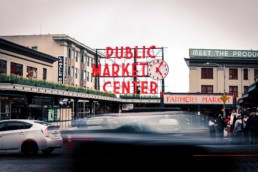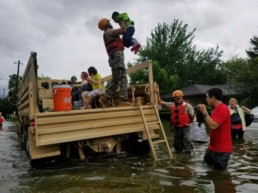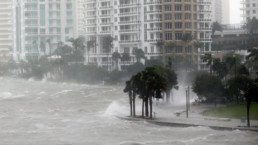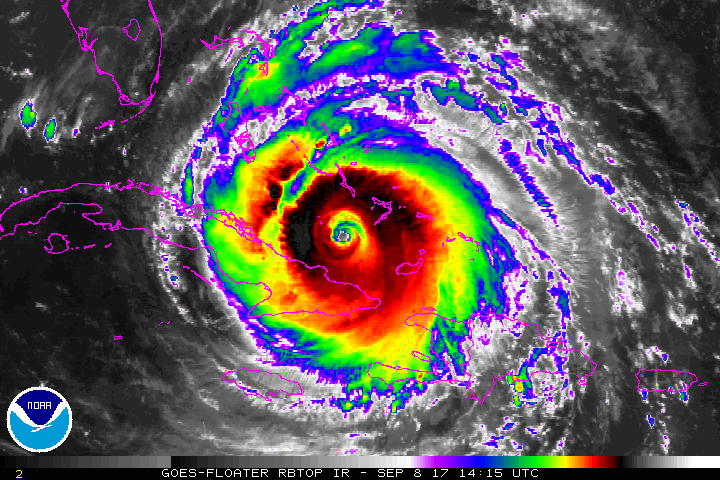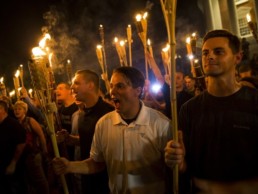TFN Launches CEO Candidate Search
|
In speaking out against federal cuts, Legacy Foundation provides a sample guide for advocacy action
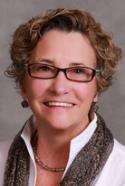
This summer, we featured a Fair Share blog post highlighting how the Legacy Foundation is leaning into advocacy — and how the foundation’s leadership helped organize stakeholders in the greater Northwest Indiana region to speak out against proposed federal budget cuts at HUD and EPA that would have severe negative impacts on the region’s low- and moderate-income population and environmental protections.
Legacy Foundation President Carolyn Saxton shared this update on the process with TFN:
“We finally got our meeting with the Congressional leaders together last Friday…not an easy process and we were not able to secure participation by Sen. Young. But we had Rep. Visclosky and Sen. Donnelly in attendance.
I am attaching some of the items from that meeting, including the agenda. Ahead of the meeting we provided our Congressmen with the participants who are signatories on the impact statement. The impact statement is attached. At the meeting we distributed the materials that informed our impact statement; those are also attached. We discussed next steps and at this point the newspapers are holding off on any coverage about these budget concerns primarily because they believe they will be dead in the water when they arrive from the President. I am not so sure but we are ready if that is not the case. Our Congressmen in attendance voiced their support for continued funding and commented that these meetings and personal correspondence are very important."
Carolyn also shared examples of an impact statement and other documents Legacy compiled to share with elected officials, which may be of interest to other funders considering similar approaches:
Impact Statement and Support Documents
Letter Opposing Changes to the Johnson Amendment
Carolyn writes:
“Taken together, the documents mentioned above offer a sample guide to advocacy action on any number of policy issues.”
For more information you can contact Carolyn directly at csaxton@legacyfdn.org.
Fair Share is an occasional column devoted to sharing innovative projects and promising practices from the OIC network. If you have ideas for a topic, or a story to share, contact Alicia at alicia@www.fundersnetwork.org.
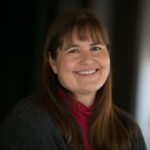 Alicia Kitsuse
Alicia Kitsuse
Program Director for Older Industrial Cities
alicia@www.fundersnetwork.org, (305) 667-6350
California wildfires: Forgotten victims, environmental hazards, and how funders can help
The deadly wildfires that have engulfed much of northern California, killing dozens of people and injuring hundreds more, represent the one of the worst firestorms in the history of the state.
Our thoughts and prayers are with our funders, friends and family in California, as well as those impacted by the devastating fires that began earlier this month. (We are happy to report that our TFN team members based in California, including those involved in our Smart Growth California initiative, are all safe.)
Here are a list of resources, stories and other useful information in the wake of the wildfires, which according to the Center for Disaster Philanthropy (CDP), "burned through 8.5 million acres, well above the 6 million acre annual average for the past year."
At least 40 people have died and hundreds of injuries have been reported, and those numbers are expected to rise. Thousands of people are under mandatory evacuation orders. The LA Times shared touching story on the lives lost to the wildfires.
CDP has compiled a growing list of donors, funds and other resources for those looking to participate in relief and recover efforts. (CDP is a partner in TFN's Philanthropic Preparedness, Resiliency and Emergency Partnership, or PPREP for short.)
Inside Philanthropy notes that funders are stepping up to address an often overlooked community that has been affected by the wildires: undocumented immigrants.
"A group of local immigrant service advocates launched the UndocuFund for Fire Relief in Sonoma County to provide direct assistance to this particular subset of victims. Direct service support comes in the form of practical things like temporary housing, home repairs, essential household items, rebuilding equipment, medical expenses, funeral expenses, and even necessary education materials. Basic needs, such as rent and groceries, are also provided for undocumented immigrants through this fund. The fund kicked off with a $50,000 challenge grant from the California Wellness Foundation, and 100 percent of the donations go to victim support. The Sebastopol, California-based Grantmakers Concerned with Immigrants and Refugees (GCIR) serves as the fund’s fiscal agent, covering administrative costs with the other partners." Read the full story here.
While the total devastation of the wildfires is still to be determined, environmental advocates and public health experts have already begun to raise concern about the long-term impacts. A story this week from the New York Times details a list of potential dangers: "Treated wood in a house’s frame, for instance, put there to prevent bacteria growth, can contain copper, chromium and arsenic. Consumer electronics contain metals like lead, mercury and cadmium. Older homes might have asbestos shingles. Even galvanized nails are a concern because when they melt they release zinc. All are potentially harmful."
“In modern times this has got be an unprecedented event, and a major hazard for the public and for property owners,” said Dr. Alan Lockwood, a retired neurologist who has written widely about public health, told the Times. He said an apt comparison might be the environmental cleanup after the terrorist attacks of Sept. 11, 2001, in New York, as debris and dust swirled through Lower Manhattan.
Is your foundation working to address the needs of those impacted by recent natural disasters? Please send updates or additional information and resources to TFN Communications Director.
Partners for Places: How Toledo developed a sustainability plan with—not for—a historic neighborhood
|
When the Toledo-Lucas Sustainability Commission wanted to bring its newly adopted “Going Beyond Green” (GBG) sustainability plan to life, the Toledo Community Foundation (TCF) knew just the place for a pilot. TCF connected the sustainability commission to the Old West End Neighborhood Initiative (OWENI), a group of resident leaders representing the Old West End, a neighborhood once home to the most well-to-do residents of Toledo whose collection of 19th century Victorian and Edwardian homes would eventually earn parts of the area a spot on the National Register of Historic Places. But the construction in the 1960s of an interstate highway, as well as considerable disinvestment and economic hardship, took a steep toll on the working-class and predominantly African American residents of the Old West End.
The Going Beyond Green sustainability plan was completed in 2014 at a moment of heightened energy around redevelopment of a former manufacturing site adjacent to the Old West End. OWENI emerged to help bring the neighborhood’s voice to the table and position residents to benefit from the redevelopment as it unfolds. The project was awarded a grant through the Partners for Places matching grant program, a successful matching grant program that creates opportunities for cities and counties in the United States and Canada to improve communities by building partnerships between local government sustainability offices and place-based foundations. Through these projects, Partners for Places fosters long-term relationships that make urban areas more prosperous, livable, and vibrant. The grant program was launched in 2012 by The Funders’ Network for Smart Growth and Livable Communities and the Urban Sustainability Directors Network (USDN). Toledo was awarded a $25,000 Partners for Places grant, which was matched by an additional $25,000 from the Toledo Community Foundation for a total of $50,000 that enabled OWENI, in close partnership with the Toledo Arts Commission to engage with the Sustainability Commission and other partners. For example, AmeriCorps provided staffing support.) |
The Arts Commission’s focus on placemaking aligned directly with OWENI’s vision to enhance the “sense of place” in the Old West End neighborhood. Their ability to convene diverse partners wove a sustainability orientation into fields such as community design, landscape architecture, arts and culture, health and wellness, and transportation. They also facilitated exploration, with the community, of approaches to implementing sustainability in the neighborhood. Christine Billau Dziad, a program officer with the Toledo Community Foundation said that engagement provided key insights. “This project enabled us to engage residents, rather than just helicopter in with skills and tools,” she said. These mutually beneficial relationships have led to authentic implementation partnerships, as well as an understanding of how to activate sustainability with partners in other communities, notes Melissa Greene Hopfer of the Toledo-Lucas Sustainability Commission. “One of the most valuable things we got from this project was the experience of what it means to develop a plan with and not for a neighborhood,” said Greene Hopfer. Alongside collaborative learning, the project provided a platform for requisite action, which resulted in a range of projects – walkable and bikeable streets, reuse plan charettes, a pollinator plan on a high traffic corner – with complementary placemaking, neighborhood beautification, nature habitat, and employment outcomes. These projects were critical to the success of the project, said Billau Dziad. “From the residents’ perspective, projects can often feel like all talk and no action,” she said. “The GBG project helped us to have an act.” About the author:
Since 1990, Danyelle O’Hara has worked with a range of organizations in the United States and internationally to help build capacity in issues related to community economic development, natural resources management, and community change. In West and Central Africa, Danyelle worked with Catholic Relief Services and the World Wildlife Fund and in the U.S., she has worked as staff to the Center for Community Self-Help and The Conservation Fund, and with numerous organizations as a consultant. Danyelle has a Bachelor’s degree in anthropology and a Master’s in international development education, both from Stanford University, and extensive experience in program development and design, program management, and evaluation.
About Partners for Places: A collaborative matching grant program, Partners for Places creates opportunities for cities and counties in the United States and Canada to improve communities by building partnerships between local government sustainability offices and place-based foundations. Partners for Places is led by TFN and our partners at the Urban Sustainability Directors Network. National funders invest in local projects to promote a healthy environment, a strong economy, and well-being of all residents. Through these projects, Partners for Places fosters long-term relationships that make our urban areas more prosperous, livable, and vibrant. To date, Partners for Places has awarded more than $5 million across North America in this successful matching grant program, leading to more than $10 million in investments.
|
Diversity is nature’s greatest strength—it should be ours, too.
“Strength in Diversity,” proclaimed the Bugler, the newsletter I picked up at Olympic National Park in Washington State. I’d taken advantage of the opportunity to explore the Pacific Northwest before our 16 fellows arrived in Seattle and Tacoma for our second PLACES gathering, and it was as if the work had started a week early.
The stunning density of the Hoh Rain Forest revealed its layers to me as yellow-green light shone through the gigantic Sitka spruce trees, Douglas firs, big leaf maples, western hemlock, and ubiquitous mosses and ferns. Tiny saplings, striving toward the light, stretched their roots around recently fallen nurse logs down to the soil for water and stability. All these beings compete fiercely for resources, but also depend on one another to cope with and adapt to changes in the environment. “The park’s variety of life,” cried the Bugler, “provides strength and resilience for the future.”
Sounds familiar?
In Seattle, in Tacoma, and in my home, the Quad Cities, we need to cope with change and adapt for the future. We know that the American cities that are growing and thriving have diversity in common. But diversity without equity and inclusion will serve none of us.
The National Equity Atlas calls our country’s increasingly diverse population “a tremendous asset in the global economy. But rising income inequality and persistent racial gaps in health, wealth, income, employment, education, and opportunity prevent low-income people and people of color from realizing their full economic potential. And as the nation becomes more diverse, the costs of inequity will grow.”
The Quad Cities urban core is actually made of five cities in northwest Illinois and Southeastern Iowa: Davenport and Bettendorf in Iowa; Rock Island, Moline and East Moline in Illinois. With growing diversity and an average racial income gap of $5 per hour in our metro area, along with disparities in educational levels needed for current and future jobs, the Quad Cities has much to do to realize our regional vision that “residents of all races, ethnicities, ages, political affiliations, religious backgrounds, sexual orientations and viewpoints […] are embraced, have an equal opportunity for success and know that their differences are the foundation for the region’s successes.”
I’m proud that our government, nonprofit, and business leaders have adopted this goal of being a welcoming and inclusive community.
As another small city setting its own image rather than letting itself be defined by others, Tacoma offers relevant lessons for my home. They too are seeing increased diversity without corresponding equity. One cooperative response comes from the Puyallup Watershed Initiative, a mix of community members, nonprofits, governments, and businesses in that watershed to increase community stewardship, strengthen local leadership, increase equity and inclusion—all in the interest of improving water quality for the people who rely on the glacial runoff of that eerie floating mountain visible all along the I-5 corridor: Mount Rainier. Each work group, coalesced around common interests like transportation, food, stormwater, and environmental education, creates a unified 20-year vision as well as shorter-term plans to accomplish goals within that time.
 The people of Seattle, too, offer lessons on the power of diverse coalitions. The Chinatown-International District —made up of Chinatown, Japantown, and Little Saigon— remains diverse despite economic pressures because of intensely careful development (and despite the forced removal and confinement of Japanese residents in the 1940s.) Today, many players are working to works to improve the neighborhood while maintaining its historical character, affordability, and diversity. They include two not-for-profit organizations that own many of the local buildings, an elected design review board with unusually strong powers, and community organizers with strong ties to the community—like Sonny Nyugen, who led us on an eye-opening tour of the Chinatown-International District.
The people of Seattle, too, offer lessons on the power of diverse coalitions. The Chinatown-International District —made up of Chinatown, Japantown, and Little Saigon— remains diverse despite economic pressures because of intensely careful development (and despite the forced removal and confinement of Japanese residents in the 1940s.) Today, many players are working to works to improve the neighborhood while maintaining its historical character, affordability, and diversity. They include two not-for-profit organizations that own many of the local buildings, an elected design review board with unusually strong powers, and community organizers with strong ties to the community—like Sonny Nyugen, who led us on an eye-opening tour of the Chinatown-International District.
Success is not guaranteed. The Center District up the hill on Jackson Street was once a thriving hub of African American homes and businesses, but fell from 80 percent black residents in the 1960s and 1970s to 11 percent today due to market pressures and racially motivated zoning. The Chinatown-International District has managed, if not escaped, gentrification—so far.
In our philanthropic roles, PLACES fellows took to heart this lesson on the strength of diverse allies. Bina Patel, our PLACES coach, says, “This is going to take a huge group of people that are not you. You’ve got to find them.” We each recognize the need to bring in unexpected partners to accomplish our varied goals while increasing equity. When I looked for allies at home, I didn’t initially look to business leaders: It’s not in every city that they come forward to stress the importance of a welcoming and inclusive community, as they have in the Quad Cities. One of our PLACES fellows articulated her realization that in advocating against an expanded border wall, southwestern hunters and environmental activists would have common cause with immigrant rights groups. And another elicited knowing laughter from all of us by encapsulating it with the words of Puff Daddy (Diddy): “Tell your friends to get with my friends, and we can be friends.” We need more friends with the same values, but different ideas.
I know what I said earlier: that there in Olympic National Park, it seemed the work of PLACES started a week early. But truly I know our work—The Work—of striving for racial equity doesn’t begin and doesn’t end. It’s a constant process, walking (or crawling) one step after another towards a world where people’s outcomes are not defined by their race. The lessons gained during my time with our PLACES coach, staff, and fellows teach me to recognize opportunities to learn and ask questions outside of our meetings. When I can spot a lesson on equity even while communing with nature, I know PLACES is equipping me to map those steps, walk those steps, and most importantly, to connect with others who want to walk with me.
Catch up on our last Going PLACES blog here.
About the Author:
Kelly Thompson, Vice President of Grantmaking and Community Initiatives, Community Foundation of the Great River Bend
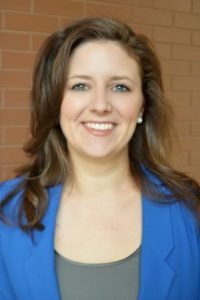 Kelly earned her Masters in Social Work from the University of Iowa and her Bachelors degree in Sociology from Augustana College. She brought to the Community Foundation nine years of experience in social services, including direct service in the areas of child welfare and homelessness; grant writing; and agency administration. As Vice President of Grantmaking and Community Initiatives, Kelly oversees grantmaking, scholarships, and the Community Foundation's collaborations with others on issues that no one organization can address alone. She also manages CFGRB’s youth philanthropy program, Teens for Tomorrow. Kelly lives in Rock Island, enjoys the local live music scene, and is active in community theatre.
Kelly earned her Masters in Social Work from the University of Iowa and her Bachelors degree in Sociology from Augustana College. She brought to the Community Foundation nine years of experience in social services, including direct service in the areas of child welfare and homelessness; grant writing; and agency administration. As Vice President of Grantmaking and Community Initiatives, Kelly oversees grantmaking, scholarships, and the Community Foundation's collaborations with others on issues that no one organization can address alone. She also manages CFGRB’s youth philanthropy program, Teens for Tomorrow. Kelly lives in Rock Island, enjoys the local live music scene, and is active in community theatre.
Register Now! Uncertain Waters: Disasters and the Needs of Vulnerable Populations
|
Harvey. Irma. Maria. As the United States and the Caribbean grapple with one of the most devastating Atlantic hurricane seasons in recent history, the impact of these storms raise important questions about disaster preparation, relief and recovery – especially for vulnerable and marginalized communities. Do our most vulnerable neighbors – including low-income households, immigrant communities, the elderly and the infirm – have the means to adequately prepare or evacuate in the face of a looming threat? What systems worked, or didn’t work, in times of crisis? And how can philanthropy support long-term recovery that is both effective and equitable? Join us for a webinar on Tuesday, Oct. 3 from 3:00 – 4:00 p.m. ET (2:00 – 3:00 p.m. CT), to hear first-hand accounts from journalists and funders whose communities were impacted by recent storms, as well as to learn how funders are working to help create more sustainable, resilient and equitable communities that can better withstand and recover from natural disasters. Register here. |
Moderator:Regine Webster, Vice President, Center for Disaster Philanthropy, a partner in the Funders’ Network’s Philanthropic Preparedness, Resiliency and Emergency Partnership (PPREP) Speakers:Elizabeth Love, Senior Program Officer, Houston Endowment Charisse Grant, Senior Vice President for Programs, The Miami Foundation Nadege Green, Social Justice Reporter at WLRN Miami, South Florida’s public radio affiliate Matt Tresaugue, former environmental reporter for the Houston Chronicle and Houston-based Communications Manager for the Environmental Defense Fund Kelly Thompson, Vice President of Grantmaking and Community Initiatives, Community Foundation of the Great River Bend and a member of TFN’s PPREP cohort. Long-term recovery from this year’s devastating hurricane season is going to take billions of dollars and strategic cross-sector collaboration between funders, government, nonprofits, and public/private humanitarian actors, according to the Center for Disaster Philanthropy. Find additional resources and ways to help here. At TFN, we are committed to working with our funders to learn, share and explore the strategies and best practices for helping communities prepare and recover from disasters in ways that take into account the needs of those most vulnerable. Stay tuned for additional webinars and other learning opportunities, including our 2018 Annual Conference, which will take place in Houston this March. |
Hurricane Irma: How Funders Can Help
As many of you know, the Miami office of the Funders’ Network has been closed as our South Florida staff prepared for Hurricane Irma and its aftermath. And while I’m pleased to report that our office fully reopened today — and our staff and their families are safe and secure — we know that the road to recovery for many affected by Hurricane Irma will be a long and complicated task.
The most powerful storm ever recorded in the Atlantic, Irma left a deadly trail of devastation across the Caribbean and the Florida Keys. Irma’s impact was felt through much of Florida, beginning with the evacuation of more than seven million people and power outages that left nearly two-thirds of the state’s population in the dark (with tens of thousands still without electricity as of this afternoon).
While damage assessments have only just begun, we’ve already seen evidence of the destruction and disruption felt by the most vulnerable in our community, including the elderly and infirm and low-income families unable to adequately prepare for the storm and struggling to deal with its aftermath.
We are also mindful of the communities in Houston and the surrounding areas still reeling from Hurricane Harvey.
These storms have cast in sharp relief the issues that TFN and our funders care deeply about: the urgency of tackling climate change, the need to build resilient and sustainable communities, and the moral obligation to adequately—and equitably—prepare and protect our vulnerable populations.
Please visit the Center for Disaster Philanthropy for more information on how to aid in the long-term recovery of communities impacted by hurricanes Harvey and Irma, as well as additional resources for funders looking to prepare communities in advance of disasters. (CDP serves as the curriculum development and technical assistance partner for TFN’s Philanthropic Preparedness, Resiliency and Emergency Partnership, or PPREP.) And in case you missed it, here is a recap and audio link to CDP’s recent webinar, Hurricane Irma: What Funders Should Know.
The Florida Philanthropic Network has also assembled a terrific list of recovery funds and efforts across the state.
On behalf of the TFN staff, I want to thank all of our members and partners who reached out in advance of and following Hurricane Irma to inquire about the safety of our Miami team.
Please be sure to follow us on Twitter for more TFN news.![]()
Preparing for Hurricane Irma: A message from TFN
With the extraordinarily large and intense Hurricane Irma drawing closer to South Florida, the Miami headquarters of the Funders' Network are currently closed.
Our staff has been working diligently this week to safely prepare our offices, as well as their homes, pets and families, in advance of the storm.
If you need immediate assistance, please contact Director of Programs Ann Fowler Wallace, who is based in Boston, at 617-524-9239/ ann@www.fundersnetwork.org.
We are closely monitoring the storm, and will reopen our Miami offices as soon as conditions safely permit.
Our thoughts are with those in the storm's path, especially those in our South Florida community who are among the most vulnerable.
The Miami Foundation has established a Hurricane Relief Fund to assist in recovery efforts, and has compiled a resource of local and national organizations that will be on the ground helping families, communities and businesses rebuild and recover.
For additional resources on philanthropy's role in disaster recovery, including the ongoing recovery of areas recently affected by Hurricane Harvey, please visit the Center for Disaster Philanthropy's website. CDP has also established a Hurricane Irma Recovery Fund to focus on medium to long-term recovery efforts.
On behalf of all of us at TFN, we wish anyone who may be impacted by Irma safety and security in the coming days.
Hurricane Harvey: How To Help (Updated)

Hurricane Harvey, the first major hurricane to make landfall in the U.S. since 2005, has led to catastrophic and deadly flooding across an enormous swath of Texas. Our thoughts and prayers are with those affected by Harvey in Houston and across the region.
We invite you to join Tuesday's webinar, Hurricane Harvey Recovery: How Donors Can Help, organized by The Center for Disaster Philanthropy (CDP) and the Council on Foundations. The webinar will offer information on how funders can assist in the immediate aftermath of Harvey, which has been downgraded to a tropical storm—as well as with what will likely be a protracted and costly recovery for the region.
As many of you know, TFN’s 2018 Annual Conference is scheduled for March 19-21 in Houston. We are closely monitoring the situation and will provide any updates once the rain stops and floodwaters recede. We have reached out to our members and partners in the region to express our concern and offer support to them, their families and their communities.
On behalf of the TFN community, we wish safety and strength in the coming days to all of our friends, members and partners impacted by Harvey, as well as to the grantees and communities they work with and serve.
Below, you’ll find more information on the webinar, how you can help in the relief efforts, as well as resources from The Center for Disaster Philanthropy. (CDP serves as the curriculum development and technical assistance partner for TFN’s Philanthropic Preparedness, Resiliency and Emergency Partnership (PPREP) working group.)
We are compiling updates, responses, and resources for for philanthropy in the aftermath of Harvey. Please send suggestions to tere@www.fundersnetwork.org.
Hurricane Harvey Recovery: How Donors Can Help
Tuesday, Aug. 29
3:30 p.m. ET/2:30 p.m. CT
Register Now!
CDP President & CEO Bob Ottenhoff will moderate the discussion. Program panelists are still being finalized and currently include:
•Renée Wizig-Barrios, Greater Houston Community Foundation's Senior Vice President and Chief Philanthropy Officer
•Damian Morales, OneStar Foundation Disaster Services program Manager and Texas VOAD Membership and Growth Committee Chair
In response to significant flooding in Texas and potentially parts of Louisiana, the webinar will focus on how to allocate resources—human, financial, and technical—to meet the needs of Hurricane Harvey-affected communities.
How to Help
Hurricane Harvey Relief Fund: The Greater Houston Community Foundation
Houston Mayor Sylvester Turner has established the Hurricane Harvey Relief Fund to accept tax-deductible flood relief donations for victims. The Greater Houston Community Foundation is administering the fund.
The CDP Hurricane Harvey Recovery Fund
Right now, attention is rightly focused on providing immediate relief to survivors–temporary shelter, food, water, and other basic needs–and watching how the storm unfolds over the course of the next week. The CDP Hurricane Harvey Recovery Fund allows donors to give now to support longer-term recovery needs. [Updated] Facebook announced Tuesday that it will match donations to the CDP's Hurricane Harvey Recovery Fund for up to one million dollars.
[Updated] NOLA Pay it Forward Fund
New Orleans Mayor Mitch Landrieu, in partnership with the Greater New Orleans Foundation, reactivated the NOLA Pay It Forward Fund for those who wish to contribute to recovery efforts.
Other Resources
Hurricane Harvey: When, How, and Where to Give
Hurricane Harvey Disaster Profile
The Disaster Philanthropy Playbook
The Disaster Philanthropy Playbook is free national resource created by the Center for Disaster Philanthropy that offers a host of strategies that funders can use to help communities in crisis.
Speaking out against hate: Our response to Charlottesville, and what our funders are saying
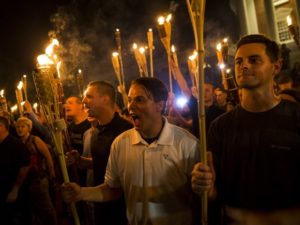
At the Funders’ Network, we have long adhered to the fundamental values that guide us as an organization: A belief that philanthropy is uniquely positioned to help create communities that are more sustainable, economically prosperous and equitable.
As a non-partisan organization that encourages robust discussion and respect of various points of view, we recognize that there is a place for nuanced debate on the tactics and strategies needed to turn these ideals into actions and outcomes.
But hatred is not a point of view. And there should not—and can never— be any moral equivocation when it comes to denouncing the vile, toxic and dangerous philosophies.
Although the fatal demonstration that shook the nation took place in Charlottesville, no one is immune from the realities of racism and bigotry these hate groups embody—or the strong range of emotions the images of the event provoke: fear, frustration, disbelief, disgust, anger. It would be understandable to feel overwhelmed in the aftermath of such a show of hatred.
But, in the face of an increasingly emboldened element of our society that has taken to public declarations of white supremacy and neo-Nazism, we are heartened by the strong denunciations from many sectors since Charlottesville, including many leading voices in philanthropy. (See a compilation of our members’ responses below).
We are committed to helping our funders in their work to strengthen communities, and engage in practices that are not only effective but equitable.
Equity in grantmaking is the cornerstone of our PLACES fellowship, whose ranks have grown to nearly 100 alumni spread throughout the world of philanthropy. Our PLACES Fellowship gives professionals in philanthropy the tools, knowledge, and best practices needed to embed an equity lens into their work. The deadline to apply for the 2018 PLACES cohort is Oct. 31.
Below are responses to Charlottesville from many of our Funders’ Network members, as well as other resources you may find useful.
James E. Canales, President & Trustee, Barr Foundation
“We at the Barr Foundation add our unequivocal voice to the growing chorus that explicitly renounces the violent expressions of hate and the vile racism and bigotry that we witnessed in Charlottesville last weekend. Of course, such sentiments are not isolated to Virginia, and with a President who increasingly empowers these fringe actors, we will see more of it...”
Bob Ross, President & CEO, The California Endowment
“It is fundamentally clear we have witnessed emboldened levels of hateful, bigoted, racist, anti-immigrant, anti-LGBT, Islamophobic, white supremacist and white nationalistic behavior. And this behavior is not coming from all sides.”
Judy Belk, President & CEO, The California Wellness Foundation
“What we’ve learned is this: The struggle is real, but there are dedicated people working every day to stop violence in our communities and to counter the racism and hate that fuels it.”
Patrick McCarthy, President & CEO, The Annie E. Casey Foundation
"The violence and tragedy of Charlottesville, and the ensuing controversy and debates over the president’s response, are prompting public and private conversations about race, ethnicity and our history. Our children are listening and watching. What do we want them to take away? What do we want them to learn?"
Grant Oliphant, President, Heinz Endowments
“Call this beast what you will—whatever the politicians may say, it is not difficult to name. It is ethnic and racial hatred and bigotry. It is domestic terrorism, white supremacy, violent extremism. It is the damage in the human heart that looks for scapegoats and finds grim solace in the diminishment of others, holding them down, punishing them for wanting to share in the basic dignities we ourselves hold dear.”
Rip Rapson, President & CEO, The Kresge Foundation
"There is no moral ambiguity about the intentionally provocative, hatefully motivated, racist, and violent behavior ignited by white supremacists last week in Charlottesville. These acts of domestic terrorism not only denigrate, but threaten to undermine, the values that men and women have been fighting for since the signing of the Declaration of Independence and that define us as a people."
Meghan Binger Brown, Board Chair, and Kate Wolford, President, The McKnight Foundation
“In condemning these events, let us not forget the many routine, nearly invisible forms of prejudice our nation must overcome. Even as brazen displays of hatred rightfully appall us, subtle, everyday acts of racism and bigotry need to be rendered just as unacceptable. This is our shared responsibility.”
Sharon Alpert, President & CEO, Nathan Cummings Foundation
“The events in Charlottesville strengthen our resolve to stand in solidarity with those working to build a more just, vibrant, sustainable and democratic future, and to counter darkness with light, and hate with love.”
Fred Blackwell, CEO, The San Francisco Foundation
“The challenges in front of us are about race, but they are also about economics and the need for greater inclusion and equity. There are no simple answers. There are no simple solutions. But all of us can take on the task of speaking up and denouncing acts of hatred.”
Other News and Resources:
• The Communications Network offered a helpful list of what non-profits can do in the aftermath of Charlottesville, which include enrolling in equity-based training, stating your values publicly (as an individual and as an organization) and participating in public gatherings and vigils. ComNet also recommends reviewing “Having an Uncomfortable Conversation,” written by Anusha Alikhan, director of communications at Knight Foundation, another TFN member.
“This call to action is a reminder that our work is never finished,” she writes. “Inclusion is a daily practice that will continue as we strive to remove barriers, close gaps and ensure that equal opportunity is available to all.”
• As The Chronicle of Philanthropy pointed out in a recent story, the “white-nationalist rally in Charlottesville, Va., provoked a strong response from many nonprofits and foundations, and it wasn’t just organizations like the NAACP and the United States Holocaust Memorial Museum. A wide variety of nonprofits quickly joined the fray with statements of outrage, hope, and healing.”
• Deconstructing the images and slogans on display in Charlottesville: Symbols on display ranged from exact replicas of the Confederate flag to altered versions of a National Hockey League team logo. As well-coordinated and meticulously organized white nationalists converged to rally in Charlottesville, they brought with them chants, banners, slurs, shields and flags. Counterprotesters, including anti-fascist groups and local residents, church groups and civil rights leaders, had their own symbols and slogans. Each of the icons spotted carried its own political context and history, according to this guide in the Washington Post.
- A CBS news station in Houston, which will be the site of TFN’s 2018 annual conference, hosted a town hall on race relations in response to Charlottesville.
Has your organization issued a response to Charlottesville? Please send any updates to tere@www.fundersnetwork.org to be added to our compilation.


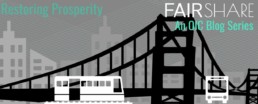
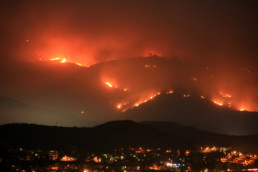
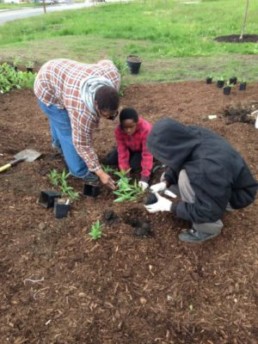
 OWENI’s commitment to revitalizing and improving the quality of life in the neighborhood, efforts that included a house-painting program for senior citizens and those with disabilities, made the Old West End an ideal laboratory for neighborhood-level, resident-led action.
OWENI’s commitment to revitalizing and improving the quality of life in the neighborhood, efforts that included a house-painting program for senior citizens and those with disabilities, made the Old West End an ideal laboratory for neighborhood-level, resident-led action.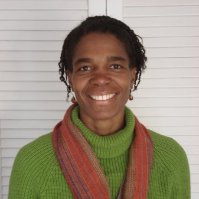 Danyelle O’Hara, Consultant for the Funders' Network
Danyelle O’Hara, Consultant for the Funders' Network